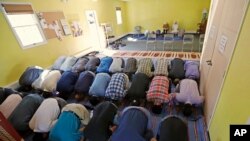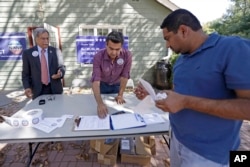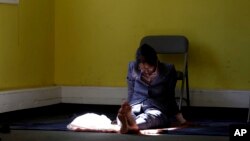A small town in the northeastern state of New Jersey has dropped its five-year opposition to the construction of a mosque, settling two separate lawsuits brought by the U.S. Department of Justice and a local Muslim group under a 2000 law protecting religious institutions from discrimination.
The settlement between the Department of Justice and Bernards Township, New Jersey is one of nearly 20 lawsuits the department has brought under the provisions of the Religious Land Use and Institutionalized Persons Act, a federal law partly designed to protect minority houses of worship and start-up churches against discrimination by local authorities.
Three other cases remain open, a Department of Justice spokesman said. Investigators are also probing a similar case involving Bayonne, New Jersey, where the zoning board rejected a local Muslim community's proposal in March to build a mosque.
The Department of Justice and the Islamic Society of Basking Ridge accused Bernards Township of violating RLUIPA by turning down the Islamic group's application in 2012 to build a mosque for the community of about 50 Muslim families.
Former mayor leads Islamic group
Amid stiff public opposition to the proposal, the town's planning board changed zoning laws in 2013 to make it virtually impossible for the group to proceed with construction on land it had purchased in 2011, and finally rejected its building application in 2015.
In March 2016, the Islamic Society of Basking Ridge, led by former mayor Mohammad Ali Chaudry, sued the town and its planning board in federal court, seeking damages. And In November 2016, the Department of Justice filed a separate lawsuit against the town.
As part of the settlement announced Monday, the town agreed to allow the group to build the mosque and to pay it $3.25 million in damages and attorney fees. Patterson Belknap Webb & Tyler, the New York law firm representing the group, said it would donate the $1.75 million in attorney fees to charity.
Settlement will lead to mosque
Acting Assistant Attorney General Tom Wheeler said the settlement will allow the Islamic Society and its members “to build a mosque and exercise the fundamental American right of freedom of worship.”
“Federal law protects people of all religious communities from discrimination and unlawful obstacles when they seek to build a place of worship,” Wheeler said in a statement.
Chaudry, who is now president of the Islamic Society of Basking Ridge, said he hopes to receive prompt approval to build.
“We look forward to welcoming people of all faiths and backgrounds to our mosque,” Chaudry said.
Rejection of mosque wasn't 'discriminatory'
The Bernards Muslim community is tiny, with about 70 members attending Friday prayers in space the Islamic Society rents from the town in the local community center, according to Chaudry.
Michael Turner, a spokesman for Bernards Township, said the town's rejection of the mosque building application was not “discriminatory,” but rather was “based on land use criteria only.”
Bernards Township is a “diverse and inclusive community,” he said, noting the town elected Chaudry as the nation's first Pakistani Muslim mayor after the terrorist attacks of Sept. 11, 2001.
Corey Saylor, a spokesman for the Council of American Islamic Relations, said the settlement "is a reminder to local officials that they should leave their personal animus toward any faith out of public decision making.”
“All Americans should have the ability to worship, or not, as they see fit,” he said.
Law has expanded 'religious liberty'
Eric Treene, the Justice Department's special counsel for religious discrimination, told a Senate panel earlier this month that the department is aggressively enforcing RLUIPA, saying the law “has done a great deal to expand religious liberty of all people.”
As of December, the department had opened nearly 100 formal investigations and filed nearly 20 lawsuits related to RLUIPA's land use provisions, according to a December 2016 letter by former assistant attorney general Vanita Gupta.
Treene said there has been an uptick in anti-Muslim cases under RLUIPA, when conservative groups launched a high-profile campaign against plans to build the so-called "Ground Zero mosque" in New York City. He said cases involving Muslim mosques and schools make up about 70 percent of all RLUIPA cases.













